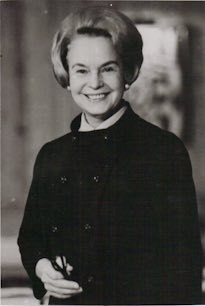Throughout her professional career, Oveta Culp Hobby held leadership positions, shaped major institutions, and influenced large numbers of people.
At 21, Hobby became an expert in the intricacies of parliamentary law, serving as parliamentarian for the Texas House of Representatives and composing a widely-read textbook on parliamentary law, Mr. Chairman, in 1937. She also rose through the ranks to become manager of the Houston Post, one of the nation’s major newspapers.
In 1941, Hobby accepted a $1-a-year position as Director of the Women’s Interest Section of the War Department. Army Chief of Staff George C. Marshall instructed her to organize a military unit for women. In 1942 Congress authorized the Women’s Auxiliary Army Corp (WAACS, later become the Women’s Army Corps, WACS).
Hobby became America’s first woman Colonel. Her leadership and organizational skills were challenged by recruiting, organizing, and training women in a military environment as often hostile as helpful. She and the WAACS met every test. As she often said, “a debt to democracy and a date with destiny.”
When she retired in 1945, she had commanded 100,00 women at more than 200 posts and in every theater of wartime operations. After the war, Hobby returned to the Post, serving as co-editor.
From 1952-1955 she played another pioneering role in government as the first Secretary of the Department of Health, Education, and Welfare. She was the only woman to serve in the Cabinet of President
Dwight D. Eisenhower.

